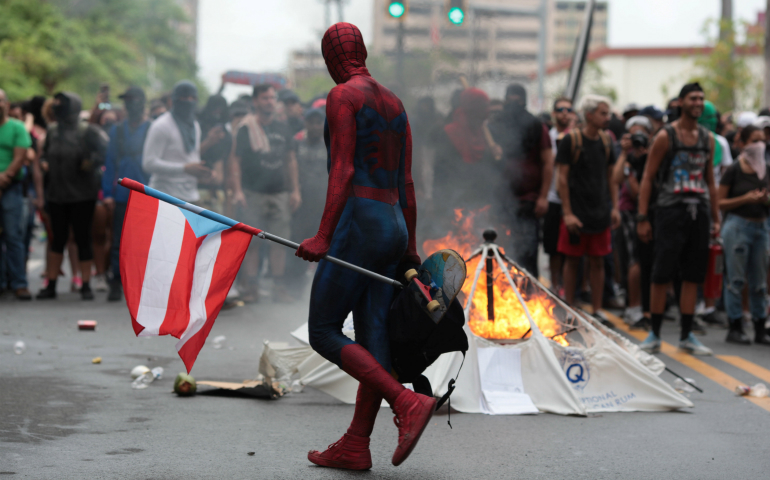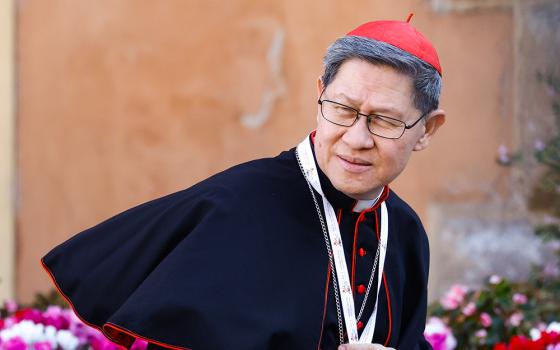
A man dressed as Spider-Man walks past a burning barricade in San Juan, Puerto Rico, May 1, to protest the government's austerity measures in the face of mounting debt. (CNS/Reuters/Alvin Baez)
Recent developments in Puerto Rico's financial turmoil have carried the island's government to a position that it tried to avoid and the local highest Catholic leader had long suggested: bankruptcy.
While San Juan Archbishop Robert Gonzalez Nieves' original idea was to try a voluntary solution by petitioning bankruptcy to the U.S. Congress, the reality of seeking protection under a type of bankruptcy declaration that was made on behalf of the government May 3 was a forced one.
"Although not a perfect solution," the archbishop wrote in Time magazine in November, "bankruptcy protection would provide a more fair, transparent system for resolving Puerto Rico's debt burden and creating the fiscal space we need to grow our economy and serve our people."
Puerto Rico, a U.S. territory, has been spiraling into default on its $72 billion debt in recent years. The situation led the U.S. Congress last year to pass the Puerto Rico Oversight, Management, and Economic Stability Act, known for its Spanish acronym, "PROMESA," or promise.
Among its provisions, the law ordered the establishment of a Fiscal Supervision Board to manage the territory's finances. The board started its work in October and, following the act's guidelines, issued a six-month stay on several legal claims that were about to be filed by creditors.
The stay expired April 30, with negotiation between creditors and government ending in a deadlock. The first lawsuits by creditors were filed May 2, but observers expect them to be resolved under the board's May 3 insolvency filing.
Eric LeCompte, executive director of Jubilee USA, a faith-based organization that focuses on debt relief, called the filing a "bankruptcy-like" step that was meant to protect Puerto Rico from creditors.
The action, while posing short-term difficulties for Puerto Ricans, will protect vital social services, health care spending and school funding, LeCompte said.
As a U.S. territory, Puerto Rico is unable to restructure its debt as a state would through Chapter 9 of the U.S. bankruptcy code.
Gonzalez used words such as "transparent" and "growth" in his Time magazine column, saying they would come about from bankruptcy because it would open the island's financial records to an audit.
However, transparency and growth are two of several hurdles Puerto Rico has faced in its financial saga.
Puerto Rico's debt has not been audited by independent financial entities, and the island's previous and current administrations have made clear they would not agree to it. The stance has sparked a popular movement demanding a thorough, independent audit of government debt.
Puerto Rico Gov. Ricardo Rossello has called an audit "a waste of funds," and successfully pushed for a law dissolving the government's Commission for Debt Auditing. Under PROMESA, the financial board is designated to conduct such an audit, however.
Growth also has been a steady part of Archbishop Gonzalez's speech, especially as it pertains to the diminishing funds used to care for poor and elderly people.
"What are those fundamental routes to not compromising Puerto Rico's fundamental right to its subsistence, to protect its poor and vulnerable, to avoid falling into, or deepening even more, a humanitarian crisis?" Gonzalez wrote in a pastoral letter April 30.
His message came before a massive protest and strike May 1 in San Juan against recent and projected austerity measures and increases in government service fees. Two days earlier, the archbishop issued an open call to support the event, saying he was offering "a gesture of pastoral accompaniment."
"Let us seek Puerto Rican unity through dialog, truth, justice, forgiveness, peace, love, and prayer," Gonzalez wrote. "We consider very important (there be) a church presence to heighten peace and non-violence at the event."
Tens of thousands of people, including other bishops, priests, religious and faithful, peacefully participated in five separate marches that came together at San Juan's financial district. But immediately after the main event concluded, a small group of hooded people started a riot, breaking windows and destroying public property. Thirteen were arrested.
Press coverage focused on the riot rather than on the demonstrators' message and gained the archbishop and others a public flurry of scornful name-calling from some government officials. He responded May 2 issuing a statement condemning the violence.
"When a protest turns violent and veers into acts of vandalism, it ceases to be the exercise of freedom of speech and turns into disorderly and criminal actions that should be condemned by society," Gonzalez said.
LeCompte said the road ahead for Puerto Rico will be filled with new challenges, but that "historic" filing opens the door to an eventual solution to the island's financial difficulties.
"There's light at the end of the tunnel," he said.





